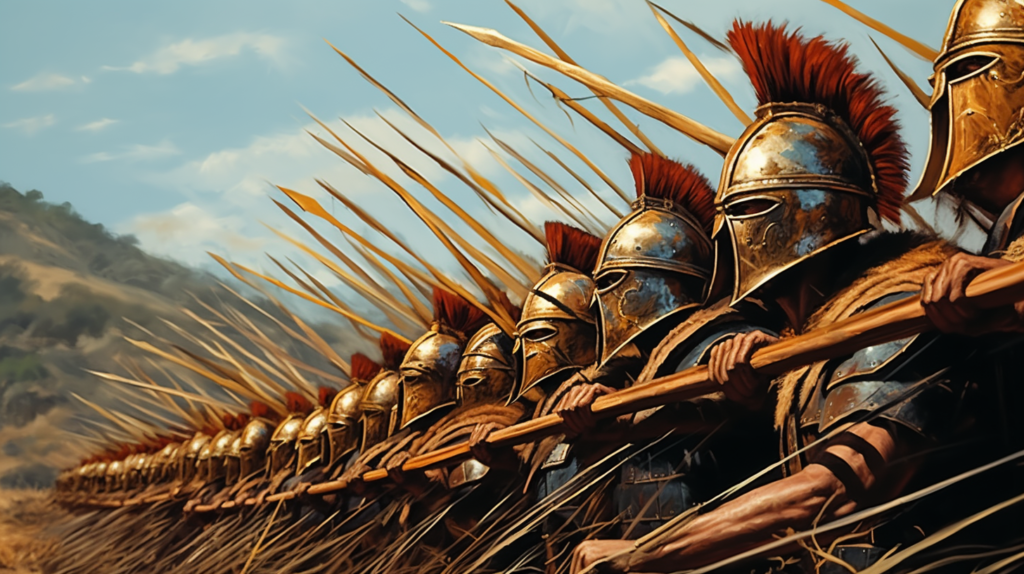Standing atop a near by hill, I witnessed a pivotal moment in ancient history unfold. The Battle of Chaeronea. It was a clash where the forces of Phillip II of Macedon triumphed over the armies of Athens and Thebes. This battle marked the dawn of a new era, as Macedon emerged as a dominant power in the Mediterranean. Let’s delve deeper into the battle, the strategies employed by both sides, and the aftermath of this historic encounter.
As I look back on the events leading up to the Battle of Chaeronea, I am reminded of the state of the 4th century BC. The Greek city-states were plagued by years of conflict and political instability. It was during this time that Phillip II recognized an opportunity to expand his kingdom and establish Macedonian dominance over the Greek peninsula. In the year 338 BC, I watched Phillip II leading his army into Greece. Here he encountered a coalition of forces from Athens and Thebes at the city of Chaeronea.
March towards Battle
The two sides were evenly matched, each army proudly boasting around 30,000 soldiers. However, it was evident that Phillip II’s army held the advantage. His troops were better equipped and better organized. The innovative tactics he had developed for his phalanx infantry reimagined the golden age of the Greek solider. As I observed the battlefield, I noticed how Phillip II strategically positioned his cavalry on the wings, while his phalanx formed a wall of spear and iron in the center. A reserve of elite troops stood behind, ready to plug holes or strike at weaknesses. It was a formation that allowed for seamless coordination and unmatched mobility.
On the other hand, I noticed that the Athenian and Theban armies had different levels of organization. The Athenian soldiers, were mostly hoplites, heavily armed infantry who fought closely together with spears and shields. As for the Thebans, they relied heavily on their elite sacred band, a unit of 300 soldiers who were specifically trained for hand-to-hand combat.
The Battle of Chaeronea

As I witnessed the scene, the Athenians and Thebans, found themselves no match to Phillip II’s impenetrable phalanx. The Golden Age of the Greek hoplites crashed down as the phalanx emerged that the dominant heavy infantry in the world. It was as the phalanx was rolling back the hoplites that the Macedonian cavalry, under the command of the young Alexander, swooped in. Crashing on the flanks of the Athenian army. The Athenian formation crumbled under the pressure. However, the brave Theban sacred band fought valiantly but eventually succumbed to the might of Phillip II’s elite reserve unit. The battle concluded with a resounding Macedonian triumph, and Phillip II emerged as the hegemon of Greece.
The Battle of Chaeronea, new age Hellenism snuffed out the old Greek order. I witnessed the beginning of the end for the ancient Greek city-states, and the rise of Macedonian dominance in the Mediterranean. It was Phillip II’s innovative tactics and superior organization that led to the defeat of the forces of Athens and Thebes. Little did I know at the time, this moment would pave the way for the eventual conquest of the Persian Empire by his son, Alexander.
Deeper Reading:
“The Greatest Battles of Ancient Greece: As Recorded by Ancient Greek Sources” by Christian Christodoulides
Using various classical sources (Herodotus, Thucydides, Xenophon, Arian, Plutarch, and Diodorus Siculus), The Greatest Battles of Ancient Greece is a compilation of all the major recorded battles to happen in the ancient Greek world, starting with the beginning of the Greek-Persian War and ending with the final moments of the wars between the surviving generals of Alexander the Great. Compiled for both the purposes of education and entertainment, The Greatest Battles of Ancient Greece serves to keep these famous personalities and moments alive for readers both young and old.
